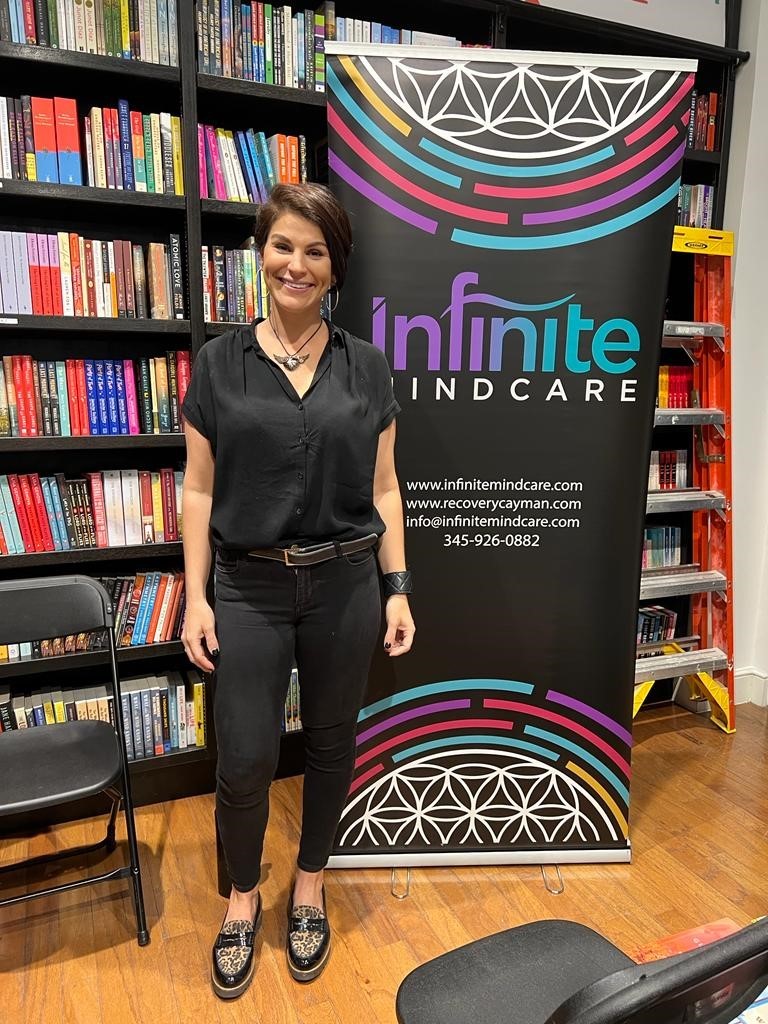Declaring “I’m about to lose it!” can mean a multitude of things, says Sutton Burke, owner and clinical director of Infinite Mindcare, a multi-speciality counselling centre offering psychotherapy for teens and adults.
Burke was speaking at the January instalment of the Infinite Mindcare Talk Series, which takes place monthly at Next Chapter in Camana Bay. Each talk has a different theme, with this one being: “I’m about to lose it – Emotional Health and Coping 101."
“It does not mean, ‘I’m going to have a nervous breakdown or a psychotic episode,'" Burke said, adding that it really means a person feels overloaded with emotions like anger, rage and disappointment. "It really represents us noticing something coming up and we don’t feel okay with it, and we’re concerned about what’s going to happen."
Burke took her audience through a detailed overview of emotional health: what it is and what it isn’t, and what people can do to not only cope better, but to also change patterns or habits into more positive ones to ensure emotional health.
She said emotional health is different from mental health.
“You can have a mental illness and have really good emotional health," she said. "On the flipside, you can have no mental illness and have really poor emotional health — a complete lack of awareness of your feelings.”
Although some people have trouble even coming up with the words to describe their feelings, others avoid them, Burke said.
“Some people push them down, which makes it really hard to live a life of close connection."
Emotional health can vary from culture to culture, Burke said. “In some cultures, it’s okay to express emotions. In others it is not," she said, adding that some clients have told her, "I don’t have feelings," "Feelings don’t matter" and "I don’t work from that emotional way of being."
ONLY GOOD IS BAD
To better comprehend the language of emotions, Burke said it’s important to understand that it’s impossible for a person to think positive thoughts all of the time. For example, she said the expression “good vibes only” is completely unrealistic.
“It’s bad advice to say 'think positive,'" she said. "Instead, we need to work with our thoughts to reframe things."
To deal with feelings that are not constructive or uncomfortable, Burke said people need to practise emotion intelligence — which helps them perceive, use and manage their emotions — and emotional regulation, which allows them to feel emotions without judgement. Infinite Mindcare offers in-depth workshops on both of these topics, Burke said, also recommending the book "EQ 2.0" — which is available at Next Chapter — for those who want to learn more about emotional intelligence and how to better understand others, particularly in the workplace.
SELF-AWARENESS
The worst thing people can do is to avoid their feelings from a given situation because it will only make things worse the next time they face a similar situation, Burke said, adding that instead, a person has to experience their feelings without judgement.
Having self-awareness and practising self-management is also important, which is learning to control impulses such as eating, shopping, binge-watching television, working or doing other things to avoid whatever emotion that feels uncomfortable.
Social awareness is also important, particularly in being aware how one's words impact others.
“Relationship management is finding common ground and being able to trust someone with your feelings," Burke said. "If we say to someone else, ‘No, you shouldn’t feel that way,’ we are trying to take away that person’s pain. It’s not our job to do that,” Burke said.
In relationships with significant others, people can often avoid addressing issues. For example, if someone’s partner is doing something that makes the person feel uncomfortable, such as making them the target of jokes, it’s important to tell their partner that if they don’t like it.
"This is an opportunity to set a boundary," Burke said.
The same holds true at work, both in terms of setting boundaries about things that make someone feel uncomfortable and in standing up for rights. For example, if an individual wants to be on a project or wants a raise, that person should have a conversation with his or her boss and not avoid it.
MINDFULNESS
Journalling is another good exercise that can help people to label their feelings, Burke said.
By expressing their feelings on paper, sometimes people can see that their feelings and thoughts about a particular topic are not really relevant.
Burke also recommended being mindful.
“Just start noticing emotions,” she said. "It’s a great place to start. However, if a person finds themselves isolating too much or getting stuck in the meaning of things, they should reach out for professional help.”
NEXT TALK
The next Infinite Mindcare Talk takes place 19 February at Next Chapter with the theme "How to spot red flags through rose-coloured glasses — catching relationship problems early."
All Infinite Mindcare talks, which start at 9 a.m., are free and open to the public. No reservations are required.
This article was originally featured in the February 2022 print edition of Camana Bay Times.
